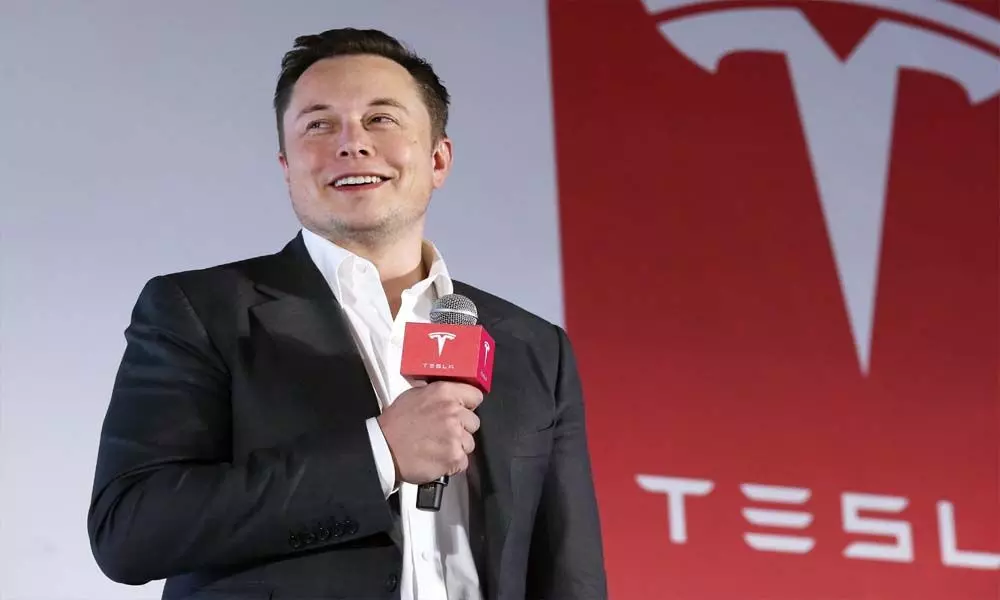Can maverick Elon Musk, his Tesla make a mark in India?
Cracking the complex Indian car market not easy even for Musk and his much-hyped Tesla; GM story tells the reality
image for illustrative purpose

Elon Reeve Musk, the world's second-richest person with a fortune of $188 billion, seems to be an entrepreneur with magical tactics and mercurial management skills. Otherwise, how can we explain the fact that Tesla Inc the electric carmaker he runs, enjoys a mammoth market capitalisation of over $600 billion, while its revenues stood at $31.5 billion and it sold just 509,737 electric cars globally in 2020?
Japan's Toyota Motor Corporation, the world's largest automaker, sold 9.53 million vehicles globally (nearly 20 times of Tesla sales), raking in $256.7 billion in total revenues. But its market capitalization on New York Stock Exchange is $293 billion now, less than half of Tesla's!
But South African-born Musk knows very well how to sell what he wants to sell. He is also expert in using social media to his and his companies' advantage.Of course, he should also get credit for popularising electrical vehicles globally though Tesla generates most of its sales from the US, China. But that doesn't justify the astronomic valuation that Tesla is getting as every established carmaker is going the electric way these days. But that's a different story.
Interestingly, maverick Musk and Tesla are in news in India in recent times as preparations by the US electric carmaker are currently underway to foray into the Indian market. Replying toa question on Twitter as to when Tesla will launch its cars in India, Musk commented that import duties on cars the highest in India among large countries.
Musk is right. The Indian government imposes 100 per cent tax on imported cars (completely built units- CBUs) that are priced over $40,000 and those below this threshold attract 60 per cent import duty. That way, only Tesla Model 3, which costs a bit less than $40,000 in the US, falls in the lower tax bracket. Post the tax, this sedan will also cost a bomb in India. As Musk pointed out, it's not easy for Tesla to generate sales in India if the electric carmaker imports its models by paying the existing duties. Either it should go for local production or make the Indian government cut taxes on EVs if it wants to make any headway in the competitive Indian automobile market where prices and affordability matter the most.
However, import duty is not the only obstacle for Musk's Indian ambitions because cracking the complex Indian automobile market is not easy for all overseas carmakers. Toyota Motors, the world's largest carmaker, is yet to make a meaningful mark in India even though the global automobile giant from Japanforayed into the country long back. The Indian story of German auto major Volkswagen, the world's second-largest automaker by sales now, doesn't paint a better picture either. American automakers also failed to catch the imagination of Indian car buyers. While General Motors Company (GM), which reigned the global automotive scene for over 76 years till 2007 as the sector's top global seller, made a painful exit from India in 2017 after sinking millions of dollars into its two car plants. It also burnt loads of cash on building its brand in India. GM's compatriot Ford Motor Company is also not in good stead in the country even though it has invested heavily. The less we talk about Nissan, another Japanese carmaker, and its European alliance partner Renault, the better. Global two-wheeler brands also failed miserably in the country and for that we have the best example in Harley-Davidsonwhich rode out of India not long ago, leaving behind a manufacturing facility and a bruised network of dealers.
So, it's better if Tesla and its co-founder Musk make a deep dive into these failure stories before venturing into the country. Besides, the mercurial business tycoonshould also make a deep study on why Suzuki Motor Corporation - the world's 10th largest carmaker which owns Maruti Suzuki - and Hyundai, the world's fifth largest automaker, are successful in India. Nonetheless, Musk will have his task cut out in India even if he develops a good strategy after pouring over the failures of global auto giants here.There will be challenges galore for Tesla.
Even though there is a lot of buzz about electric vehicles and the central government has announced a number of policy initiatives to encourage electric mobility in the country, the ground reality is starkly different. India is far behind the US and even China when it comes to critical infrastructure like charging stations which is imperative for the electric mobility ecosystem to evolve.Further, sales are abysmally low as prices of electric vehicles are comparatively higher than those of their diesel and petrol rivals. For Indians, price matters more than anything else.
But I know very well that Elon Musk is not new to such challenges. Besides, he has the knack of turning odds into his favour. And thanks to his Tweets and replies to a handful of Twitter users from India, Tesla has already become a popular automotive brand. The Indian government and many State governments are ready to roll out a red carpet if Musk comes to India with plans to sell Tesla cars and set up a manufacturing facility. The billion-dollar question is whether Musk will be able to make a mark and turn Tesla into a successful car brand in India. Only time will have an answer for this though the track record of many global auto brands is grim in India. Anyway, best of luck to Musk and his Tesla for their Indian entry whenever that happens. Hopefully, the much-hyped Musk baby will not go GM and Harley-Davidson way.

